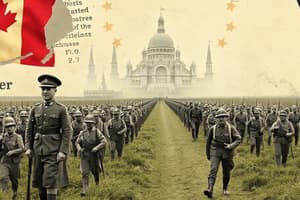Podcast
Questions and Answers
What was the event that triggered the beginning of the Second World War?
What was the event that triggered the beginning of the Second World War?
- The Battle of the Atlantic
- The creation of the Bank of Canada
- The Government of Canada's apology for wartime wrongs
- The invasion of Poland by Adolf Hitler (correct)
What was the primary role of the Royal Canadian Navy during the Second World War?
What was the primary role of the Royal Canadian Navy during the Second World War?
- To invade German territories
- To protect convoys of merchant ships against German submarines (correct)
- To provide military aid to Britain
- To transport refugees fleeing Nazi Germany
What was the significance of the Government of Canada's apology in 1988?
What was the significance of the Government of Canada's apology in 1988?
- It marked the beginning of the Battle of the Atlantic
- It compensated victims of wartime wrongs (correct)
- It established the Bank of Canada
- It marked the end of the Second World War
What was the approximate population of Canada and Newfoundland during the Second World War?
What was the approximate population of Canada and Newfoundland during the Second World War?
How many Canadians and Newfoundlanders served in the Second World War?
How many Canadians and Newfoundlanders served in the Second World War?
What was the result of Canada's involvement in the Second World War?
What was the result of Canada's involvement in the Second World War?
What was the primary reason for the decline in immigration to Canada during the Second World War?
What was the primary reason for the decline in immigration to Canada during the Second World War?
What was the role of Canada's Merchant Navy during the Second World War?
What was the role of Canada's Merchant Navy during the Second World War?
Who was the leader of Germany during the Second World War?
Who was the leader of Germany during the Second World War?
What was the significance of the poem 'In Flanders Fields' in the context of the Second World War?
What was the significance of the poem 'In Flanders Fields' in the context of the Second World War?
Flashcards are hidden until you start studying
Study Notes
World War I and Canada
- The Battle of Amiens on August 8, 1918, marked a significant victory for Canadian forces; Germans referred to it as “the black day of the German Army.”
- Following Amiens, key battles included Arras, Canal du Nord, Cambrai, and Mons, contributing to the eventual end of World War I.
- Armistice signed on November 11, 1918, following the surrender of Germany and Austria.
- Over 60,000 Canadians lost their lives, and around 170,000 were wounded during the conflict.
- The war enhanced national and imperial pride in Canada, especially in English-speaking provinces.
- Formation of the Canadian Expeditionary Force (later known as the Canadian Corps) occurred in response to Germany's 1914 attack on Belgium and France.
- More than 600,000 Canadians served in World War I, predominantly as volunteers, from a total population of approximately eight million.
- Between 1914 and 1920, the Canadian government interned over 8,000 former Austro-Hungarian subjects as "enemy aliens," despite British disapproval.
- During the South African War (Boer War, 1899–1902), over 7,000 Canadians volunteered, with more than 260 casualties; notable battles included Paardeberg and Lillefontein, which bolstered Canadian national pride.
- April 9 is commemorated as Vimy Day, celebrating the significant Canadian victory at Vimy Ridge.
Historical Context of Canada's Development
- The War of 1812 influenced the present Canada-U.S.A border, ensuring Canada’s independence from the United States.
- Democratic institutions in Canada evolved gradually; the first elected representative assembly was in Halifax in 1758.
- Prince Edward Island elected its assembly in 1773, and New Brunswick followed in 1785.
- The Constitutional Act of 1791 created two regions: Upper Canada (later Ontario), primarily Loyalist and English-speaking, and Lower Canada (later Quebec), predominantly Catholic and French-speaking.
- British naval supremacy was established after the defeat of Napoleon at the Battle of Trafalgar in 1805, allowing Canada to remain part of the British Empire amidst European conflicts.
- The United States initiated an invasion of Canada in June 1812, mistakenly believing it would be an easy conquest; Canadian volunteers and First Nations, including Shawnee led by Chief Tecumseh, played a crucial role in defense efforts.
Studying That Suits You
Use AI to generate personalized quizzes and flashcards to suit your learning preferences.




